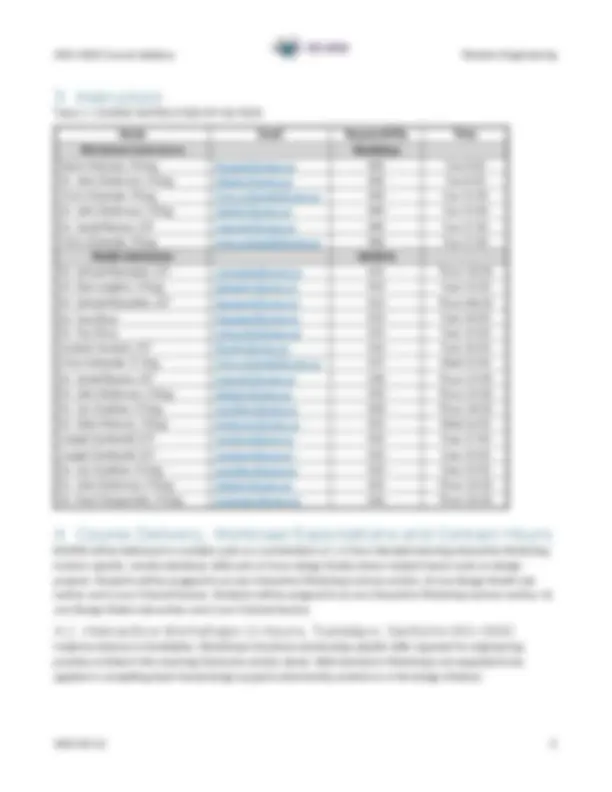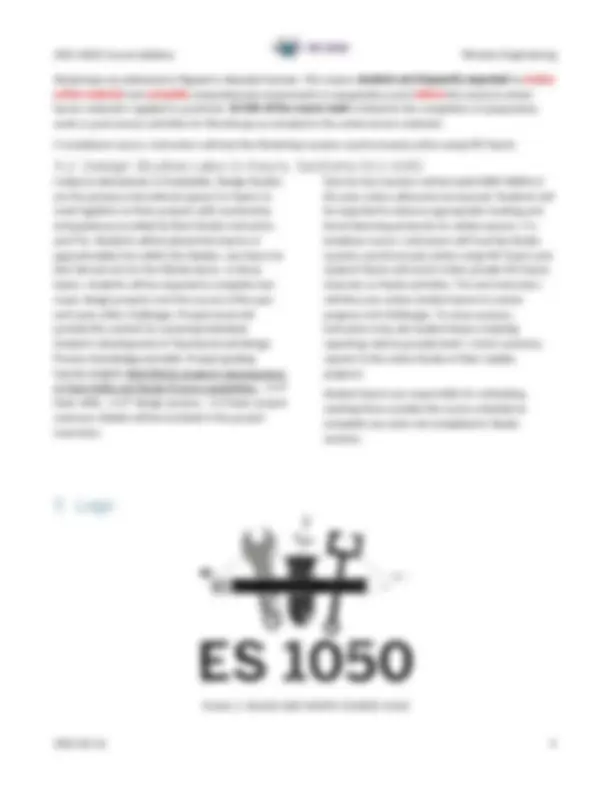





Study with the several resources on Docsity

Earn points by helping other students or get them with a premium plan


Prepare for your exams
Study with the several resources on Docsity

Earn points to download
Earn points by helping other students or get them with a premium plan
Community
Ask the community for help and clear up your study doubts
Discover the best universities in your country according to Docsity users
Free resources
Download our free guides on studying techniques, anxiety management strategies, and thesis advice from Docsity tutors
The course syllabus for es1050 foundations of engineering practice at western engineering. It covers course learning outcomes, instructors, delivery methods, workload expectations, and contact hours. The syllabus emphasizes the development of professional engineering behavior, teamwork, and design process skills through interactive workshops, design studios, and team-based projects. It also highlights the importance of communication skills and the use of online platforms for course materials and communication.
Typology: Schemes and Mind Maps
1 / 5

This page cannot be seen from the preview
Don't miss anything!




1 Calendar Description______________________________________________________________________ 1 1.1 Text and Reference Materials___________________________________________________________ 1 1.2 Branding____________________________________________________________________________ 1 2 Course Learning Outcomes_________________________________________________________________ 1 3 Instructors______________________________________________________________________________ 3 4 Course Delivery, Workload Expectations and Contact Hours_______________________________________ 3 4.1 Interactive Workshops (2-hours, Tuesdays, Sections 001-006)_________________________________ 3 4.2 Design Studios Labs (2-hours, Sections 011-026)____________________________________________ 4 5 Logo___________________________________________________________________________________ 4 6 Signature_______________________________________________________________________________ 5
Introduction to the principles and practices of professional engineering. Team-based design projects provide context for developing research, critical thinking, and problem-solving skills along with professional behaviour. Includes elements of need recognition, conceptualisation, prototyping, and engineering design to satisfy commercial specifications. Emphasis on creativity, teamwork, time management, communication and engineering skills necessary to practice in any engineering discipline. 1.1 Text and Reference Materials No required text. Lecture notes and supporting course information will be posted to Owl or shared through dedicated course MS Team sites. Students will be required to contribute monetarily towards the construction of prototypes for team projects, as necessary. Suggested readings may be posted to Owl. 1.2 Branding ES1050 makes an effort to brand its materials to create a visually connected collection of learning materials to aid in students mentally connecting elements together. A modified course logo is included at the bottom of this document in Figure 1 on Page 4.
2 Course Learning Outcomes At the end of the course students will be able to model professional engineering behaviour and work in teams to execute all parts of a systematic design process, including seeking and critically examining information identifying and addressing knowledge gaps and communicating effectively with clients and other stakeholders. The purpose of ES1050 is to teach and develop in students the knowledge and skills necessary to: Work in a (multi-disciplinary) team, Communicate with all project stakeholders, Apply the engineering design process, and Creative thinking to resolve open-ended design problems. Essentially, the Foundations of Engineering Practice. Reframed in terms of attributes recognised by the Canadian Engineering Accreditation Board, ES1050 teaches and develops the following skills and knowledge (in rough order of emphasis):
Workshops are delivered in flipped or blended formats. This means students are frequently expected to review online material and complete comprehension assessments or preparatory work before the sessions where lesson material is applied or practiced. 25/200 of the course mark is linked to the completion of preparatory work or post session activities for Workshops as included in the online lesson materials. If a lockdown occurs, instructors will host the Workshop sessions synchronously online using MS Teams. 4.2 Design Studios Labs (2-hours, Sections 011-026) Coded as laboratories in timetables, Design Studios are the primary instructional spaces for teams to work together on their projects with mentorship and guidance provided by their Studio instructors and TAs. Students will be placed into teams of approximately five within the Studios, one team for the Fall and one for the Winter terms. In these teams, students will be required to complete two major design projects over the course of the year and some other challenges. Project work will provide the context for assessing individual student’s development of Teamwork and Design Process knowledge and skills. Project grading heavily weights INDIVIDUAL student’s development of Team Skills and Design Process capabilities: ~1/3rd team skills, ~1/3rd^ design process, ~1/3 team project outcome. Details will be included in the project overviews. Face-to-face sessions will be held EVERY WEEK of the year unless otherwise announced. Students will be expected to observe appropriate masking and hand cleansing protocols for safety reasons. If a lockdown occurs, instructors will host the Studio sessions synchronously online using MS Teams and student Teams will work in their private MS Teams channels on Studio activities. TAs and instructors will then join online student teams to review progress and challenges. To close sessions, instructors may ask student teams (rotating reporting role) to provide brief (~1min) summary reports to the entire Studio of their weekly progress. Student teams are responsible for scheduling working times outside the course schedule to complete any work not completed in Studio sessions. 5 Logo FIGURE 1 : BLACK AND WHITE COURSE LOGO
6 Signature ___________________________________ _____________________ Accepted By (Student Signature) Date